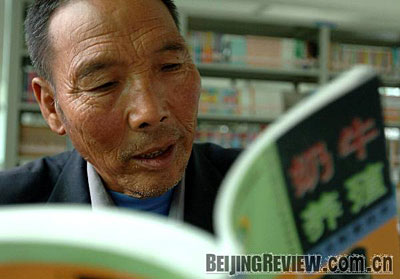|

After a hard day's work in the potato fields, Shi Zhengchang rushes back to his single-story brick house in the village of Lijiabao, Gansu province, for a quick supper before opening his doors to fellow villagers.
For Shi is also the community librarian.
Farmers in the village, young and old, all head to Shi's home to read and borrow books, newspapers and magazines.
A room in his home was made into the "farmers' book house" with money from the government. The authorities also pay for all the publications.
By the end of the year, 60,000 such libraries will be built and farmers nationwide will be able to enrich themselves with books paid for by the government, Li Dongdong, deputy director of the General Administration of Press and Publications (GAPP), told China Daily on the sidelines of yesterday's CPPCC session.
In his work report delivered on Wednesday, Premier Wen Jiabao pledged to push the building of such libraries for farmers and address "a great imbalance in the development of culture in urban and rural areas".
Each library will hold no less than 1,500 books, 30 newspapers and magazines, as well as 100 digital sound or video products, Li said.
The project to build the libraries was launched by eight ministries headed by the GAPP early last year, with 20,000 such libraries having been built with central government funding of 10 million yuan ($1.4 million).
Funding has been boosted this year, with a budgeted 600 million yuan expected for the libraries with building focused in the middle and western parts of the country, Li said.
Local governments have also been discussing with farmers over which books to include in libraries, under GAPP guidelines.
The ambitious blueprint of the GAPP targets for 20,000 libraries to be built by the end of 2010, and each of China's 640,000 villages will have such a "house" by 2015.
By last October, 552 "houses" had been built in Gansu province. The annual income of a rural household in the province is below 2,000 yuan and a farmer spent an average of about 30 yuan on cultural needs in 2006, according to the National Bureau of Statistics.
"I can read and I love books, but they are too expensive for me to buy," Shi said.
More than 1,500 of the 2,000 people in the village have borrowed books from Shi's "house".
"Now those people who used to spend all their spare time drinking and gambling come to my place to read instead, and a lot of parents send their children here after school," he said.
(China Daily March 12, 2008) | 